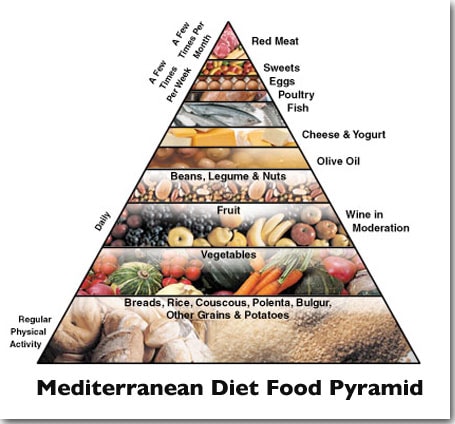 With our aging population, cardiovascular disease has become an increasingly important concern. In fact, cardiovascular disease has been the number one cause of mortality in the United States for the past 100 years!
With our aging population, cardiovascular disease has become an increasingly important concern. In fact, cardiovascular disease has been the number one cause of mortality in the United States for the past 100 years!
Common risk factors for cardiovascular disease include: hypertension (high blood pressure), smoking, high cholesterol levels ( high LDL cholesterol/low HDL cholesterol), diabetes mellitus, family history of premature coronary heart disease (first-degree male relative <55 or female <65), and obesity as well as a sedentary lifestyle.
]In a previous post, I summarized the results of a study which demonstrated that the Mediterranean diet was effective for promoting weight loss.
To take a step back…
What is the Mediterranean Diet?
For a detailed description, refer to this article from the Mayo Clinic:
The Mediterranean diet traditionally includes fruits, vegetables, pasta and rice. For example, residents of Greece eat very little red meat and average nine servings a day of antioxidant-rich fruits and vegetables.
One of the markers for cardiovascular risk that researchers often refer to is decreased heart rate variability. It’s basically a measure of autonomic dysfunction (autonomic nervous system) that’s associated with an increased risk for cardiovascular disease, congestive heart failure, sudden death, and panic disorder among other conditions.
Some of my own previous research explored the increased cardiovascular risk observed in patients with panic disorder:
An infusion of free fatty acids (FFA) in healthy volunteers (HVs) resulted in decreased heart-rate variability,and it has recently been shown that decreased heart-rate variability correlates with an increased risk of sudden death. Indeed, decreased heart-rate variability has been demonstrated in patients with panic disorder (PD). Therefore, this demonstration that induced panic attacks result in the release of FFAs suggests two possible underlying mechanisms for the greater cardiovascular mortality rate in PD patients. (Morrow et al, 2003)
A recently published study in the medical journal, Circulation. Cardiovascular Quality Outcomes, found that the Mediterranean diet is associated with higher heart rate variability (Dai et al, 2010). Specifically, the study included 276 middle age male twins and looked at food questionnaire results. How well the participants’ diets adhered to the Mediterranean diet was analyzed along with their ECG (electrocardiogram) results The study authors found that adherence to a Mediterranean diet was associated with a higher degree of heart rate variability.
Results of Research Study on the Mediterranean Diet
While adjusting for other potential confounding variables, the study authors found that for every one unit higher score (or closer adherence to the Mediterranean diet), the heart rate variability parameters increased by 4-13%.
So what does this mean?
The results of this study suggest that the Mediterranean diet may be beneficial at improving cardiac autonomic function. Or in other words, it’s one more piece of evidence to explain the cardioprotective benefits of this diet. The Mediterranean diet affects the heart in many ways including by reducing systemic inflammation, oxidative stress, and by promoting weight loss.
Dr. Jun Dai was quoted by heartwire with the following conclusion:
This really gives physicians more incentive to persuade their patients to choose a healthier diet, like a Mediterranean diet
References:
- Dai J, Lampert R, Wilson PW, Goldberg J, Ziegler TR, Vaccarino V. Mediterranean Dietary Pattern Is Associated With Improved Cardiac Autonomic Function Among Middle-Aged Men: A Twin Study. Circ Cardiovasc Qual Outcomes. 2010 Jun 15.
- Morrow JD, McManus K, Tait GR, Bellavance F, Chrapko W, Lara N, Le Mellédo JM. Pentagastrin-induced release of free fatty acids in healthy volunteers and patients with panic disorder: effect of pretreatment with ethinyl estradiol. J Psychiatry Neurosci. 2003 Mar;28(2):127-33.





